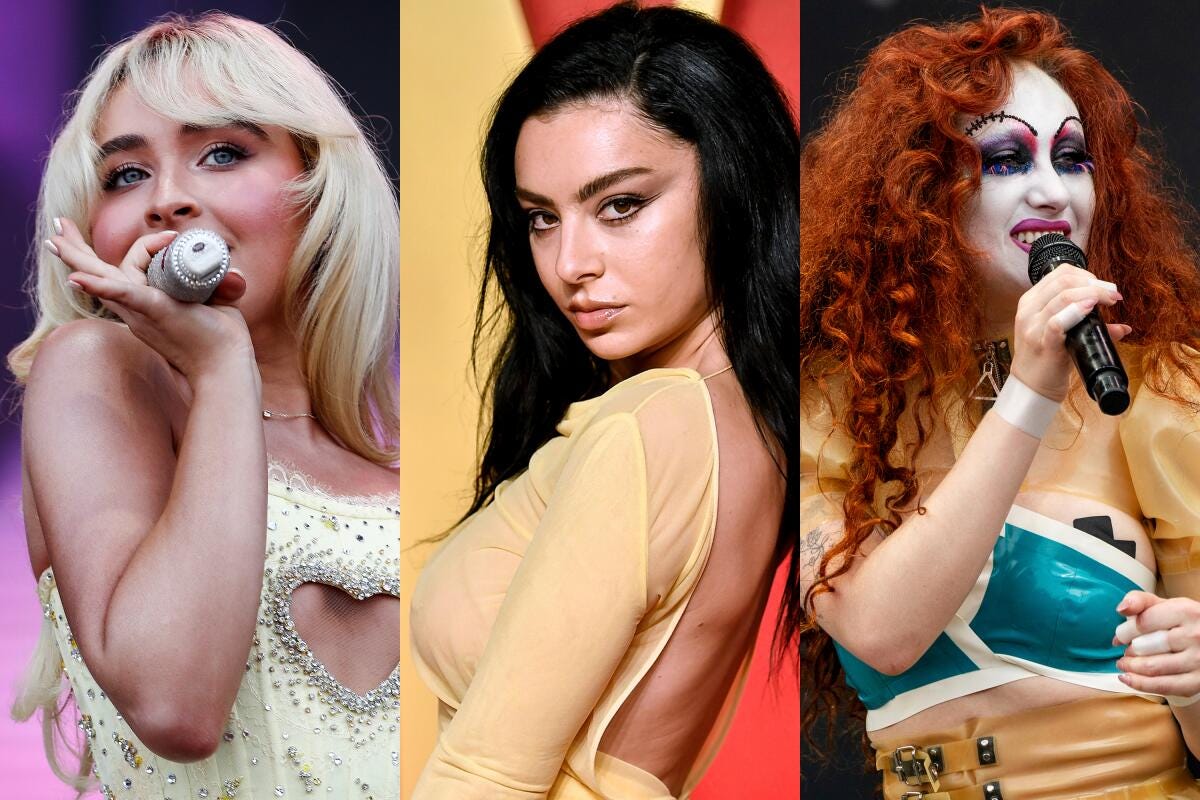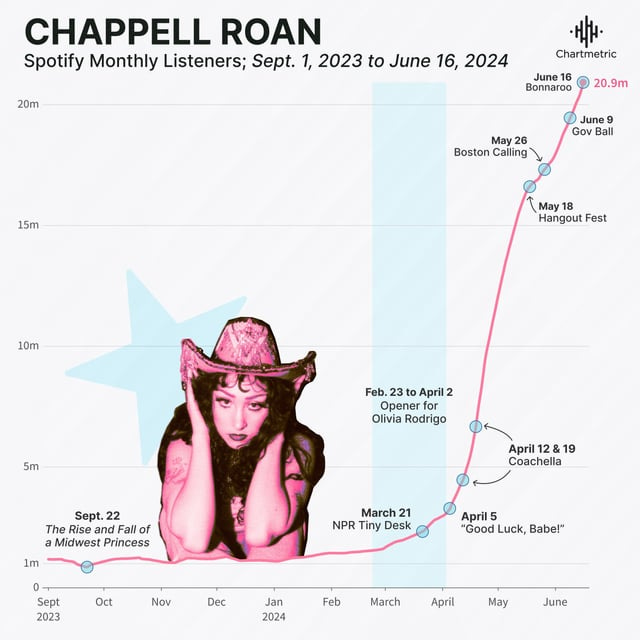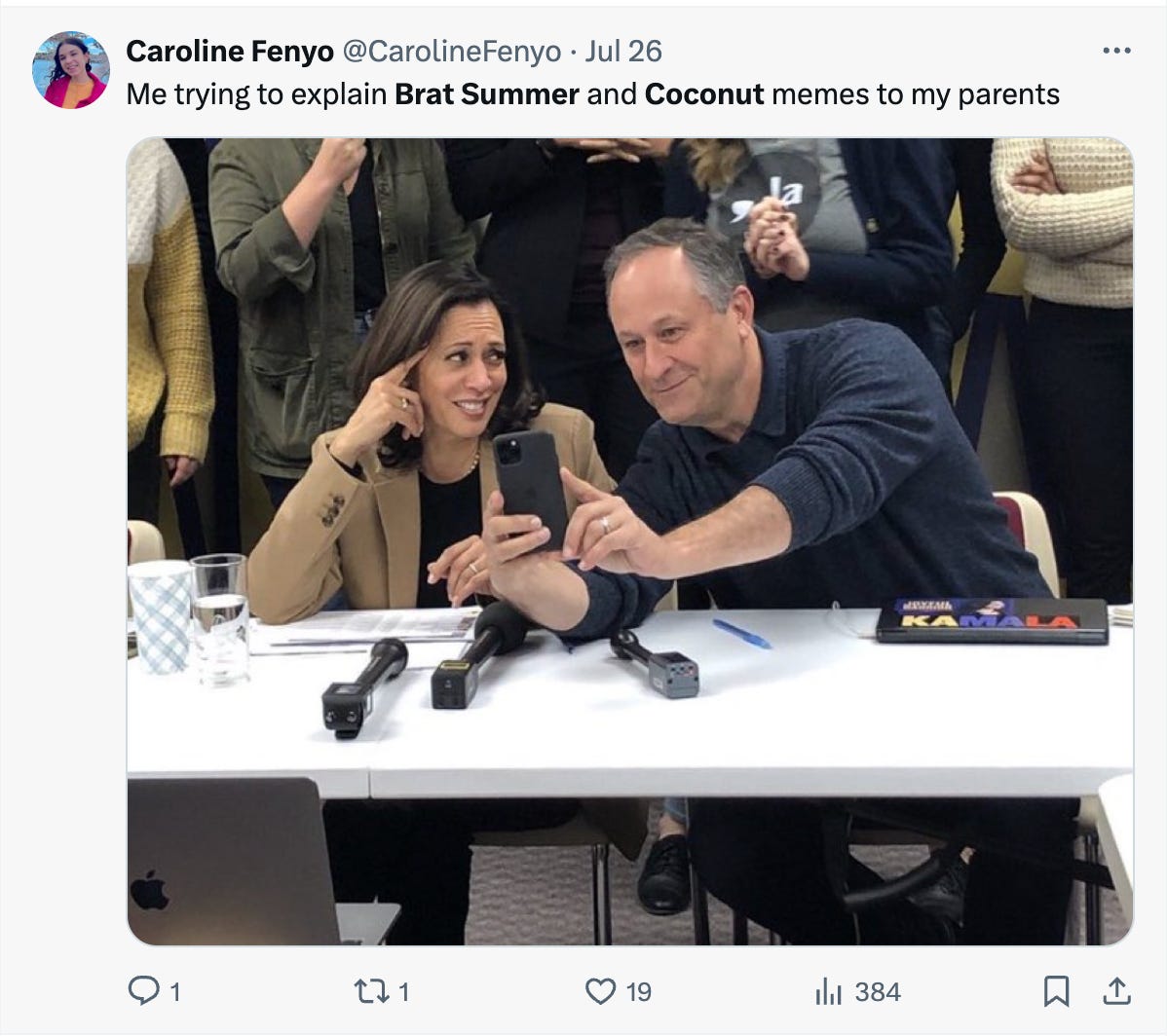This year, the Sounds of the Summer were the gift that kept on giving. I think it’s the first summer in which we had genuinely fun, interesting, and culturally significant pop music since the pandemic. Here’s why:
The Rise of a Midwest Princess
First, we had fresh, interesting music because we had fresh talent. No artist better encapsulates this than Chappell Roan. After Chappell opened for Olivia Rodrigo’s Guts World Tour and released "Good Luck Babe,” Chappell’s popularity truly skyrocketed:
Chappell Roan’s operatic vocals and stage presence are formidable—we haven’t seen a performer with her talent and over-the-top aesthetic since Lady Gaga. Roan’s songwriting further strikes a chord with her Gen Z audience, making for instantly viral sound bites on TikTok and Reels. For example, with “HOT TO GO!,” Chappell signs each letter of the phrase, creating a universal YMCA-like choreo for Gen Z to learn and post about. And on “Good Luck, Babe,” Roan cautions an ex about the perils of hook-up culture, a romantic hellscape that every young woman can relate to. But the synth is so strong and Roan’s voice is so hypnotic that you’re screaming “I told you so!” so loudly that you don’t bother internalizing Roan’s cautionary tale.
Both “Good Luck, Babe” and “HOT TO GO!” layer her vocals so it sounds like she has a chorus singing with her. I think the choral motif makes her music—already distinct and retro—extra catchy. You want to sing along because the song already layers multiple voices. This production technique makes her music feel like a communal experience—somewhere out there, I know someone is also singing her music with their “arms out like an angel through the car sunroof.”
We haven’t had dramatic, Kate Bush-esque pop in so long, music that makes you wish you were at Coachella to hear it live. I’m so grateful our Midwest Princess injects her music with a wonderful flair for the dramatic—pop needs it.
I’m Working Late…: Smart and Strategic Singers
Like Chappell Roan, Sabrina Carpenter was poised for a meteoric rise. After a string of sleeper hits with “Nonsense” and “Feather” and opening for Taylor Swift on The Eras Tour, Sabrina Carpenter gained bonafide pop stardom with her single “Espresso.”
“Espresso” is easy, breezy, and beautiful. The lyrics don’t make sense, the innuendos are silly and raunchy, and Sabrina’s theatrical, saccharine voice caffeinates the disco-driven melody. It’s pop perfection and captures Sabrina’s aesthetic perfectly: a Polly Pocket bombshell whose confidence is even higher than her boots.
This summer, Chappell Roan and Sabrina Carpenter gave us a masterclass in pop stardom. First, they used the best producers in the business: Chappell worked with Dan Nigro, who also produced Olivia Rodrigo’s first two albums and Sabrina’s previous album emails I can’t send. For her latest album Short n Sweet, Sabrina worked closely with pop powerhouses Jack Antonoff (of Taylor Swift, Lana Del Rey, and Lorde fame), Amy Allen, and Ian Kirkpatrick. From a production standpoint, Chappell and Sabrina were destined to succeed in making tight, bouncy pop.
Sabrina and Chappell didn’t just deliver strong singles, they had the talent and aesthetic niches to match. Chappell’s drag makeup and feathery costumes bolster her operatic voice and stage presence: she’s here, she’s queer, and she’s here to stay. Sabrina’s sweet and seductive songs create broad appeal and endless marketing opportunities. Her euphemistic lyrics and hyper-feminine persona landed her a Skims loungewear collection and a signature Erewhon smoothie to promote Short n Sweet. Sabrina smartly pulls from her celebrity status, too. Her songs allude to her high-profile relationships with Shawn Mendes and Barry Keoghan, making lyrical analysis a staple on pop music Twitter.
Pop music has not always been kind to young women who assert their talent, sexuality, and strategy with such boldness. Chappell and Sabrina succeeded by finding a niche that highlights their vocal talent and signature looks. Chappell and Sabrina fully embraced their eras, leaving no room for doubt and no tickets left to buy. From drag to dolls, Chappell and Sabrina headlined (and sold out) the stage this summer.
Brat Summer: When Pop Becomes Political
You think I just fell out of a coconut tree? Of course, I’m going to talk about Brat Summer. After all, it exists in the context of all in which you live and what came before you.
This summer, Charli XCX’s album Brat created a cultural inflection point. With Brat’s techno bops and streak of irreverence, Charli XCX cements herself as pop music’s favorite renegade—on the album’s first track, 360, she declares: “if you love it / if you hate it / I don’t fucking care what you think.” Charli XCX and her team carefully crafted Brat to sound self-assured, independent, and defiant. The self-imposed label of “Brat” in itself is liberating—Charli XCX has an attitude and she knows it.
As it turns out, Brat and its renegade messaging coincided with Kamala Harris’ turbo-charged election campaign. After Charli XCX anointed Harris as "brat,” the Harris campaign jumped at the opportunity to engage younger votes and signal the campaign’s own Brat-esque confidence. The Harris team even rebranded their logo:
I don’t think Charli XCX could have predicted that her album would shape a major presidential campaign. Brat Summer reminds us that pop music shapes culture just as much as culture shapes music. Chappell, Sabrina, and Charli XCX shaped our summer with their unapologetic confidence and individual aesthetic appeal. Chappell delivered 80s melodrama, Sabrina brought hyperfeminine pop, and Charli XCX gave us techno club classics. Each artist created interesting, cohesive, and distinct sounds that soundtracked our summer, from music festivals to bougie smoothie runs to club raves. We desperately needed a femininonemon, and we got it.
That’s all from me, brats. You can listen to Chappell, Sabrina, and Charli XCX’s singles plus a few more of my favorites here.
Thanks for reading,
The Culture Cowboy








